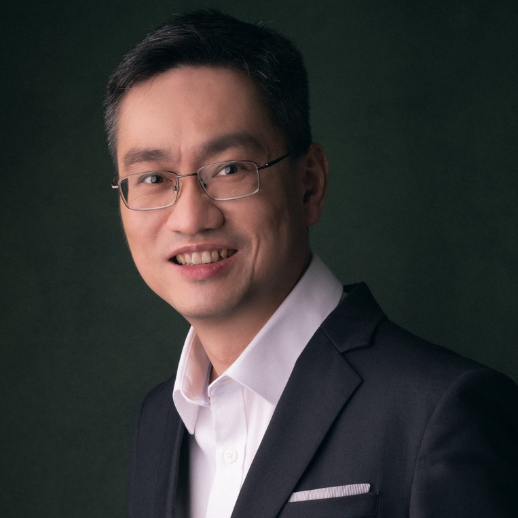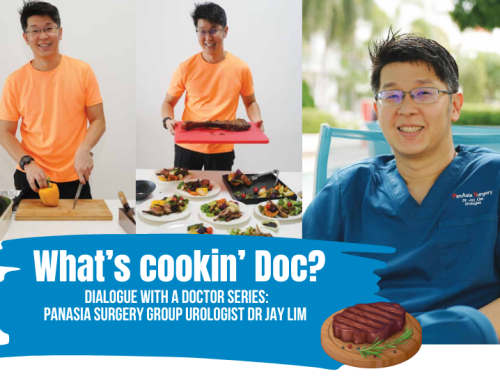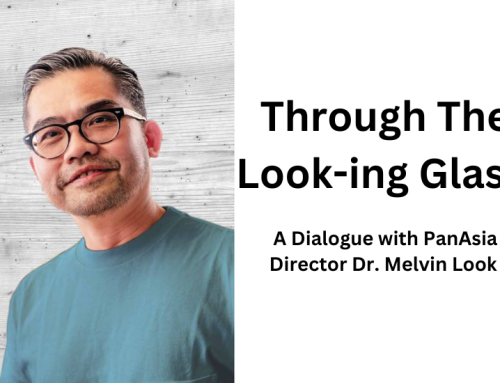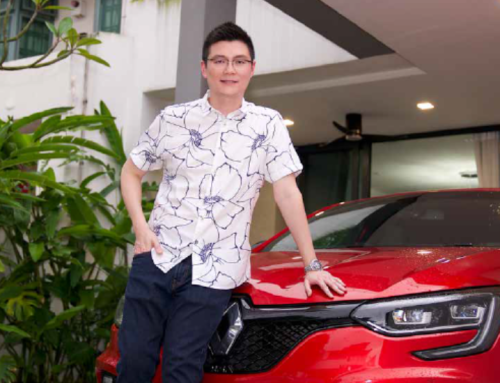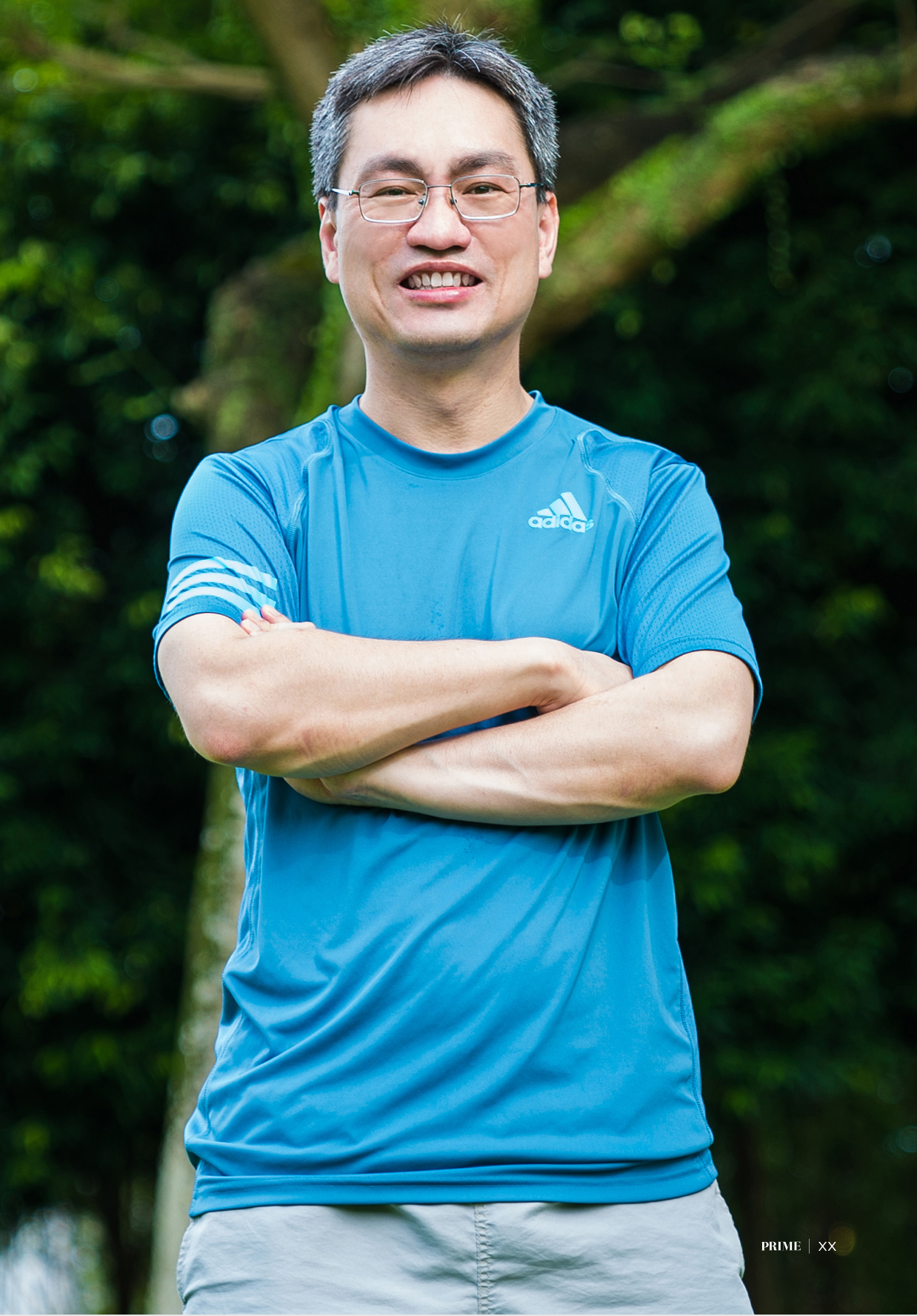
Surgical robotics is an evolving field that has seen great advances over the past decades. The first surgical application of industrial robotic technology took place in 1985, when an industrial robotic arm was modified to perform a stereotactic brain biopsy. Over the years, as clinical trials demonstrated greater accuracy of robotic technology aligned to conventional techniques, robotics began to become more widely used for many different types of surgery, including urology.
Today, robot-assisted surgery is well-established in urology and is regarded as a key surgical tool for operations on the prostate, kidney and bladder. The continual evolution of robotics will see this technology play a critical role in the present and future of urological surgery.
In this issue, we have the pleasure of speaking with Dr Terence Lim, Medical Director and Senior Consultant Urologist at Assure Urology & Robotic Centre. Dr Lim is a noted expert on urological robotics surgery, and has been involved in over 700 of such operations. He was the first in Singapore to perform a robot-assisted retzius-sparing prostatectomy. Dr Lim shares with Prime his perspectives on health and wellness, as well as how his hobby in video and computer games has helped in his practice of robotic surgery.
Good morning, Dr Lim. It is a lovely weekend morning to be at a park for some much-needed exercise. Let us talk while we have a brisk walk and jog. First off, what do the terms “health” and “wellness” mean to you?
Dr Terence Lim: Let me quote some official definitions to answer this question. The World Health Organisation (WHO) defines health as “a state of complete physical, mental and social well-being, and not merely the absence of disease or infirmity,” while the National Wellness Institute defines wellness as “an active process through which people become aware of and make choices toward a more successful existence.”
Summarising these two definitions, I think we can say that health refers to a person’s physical, mental and social state, while wellness is an intentional and active process of improving a person’s well-being.
A lot of young people do not consciously think about their health. They like to think of themselves as invincible. Health consciousness often only occurs when they get older or when they suffer some major disruptions to their health. Were you conscious about your health in your younger days? And do you think you have a healthy lifestyle now?
TL: To be honest, I was never health conscious when I was young. And I was not so in my adulthood, even after becoming a doctor. I only became more health conscious after the birth of my kids and when I reached 40 years old. It then suddenly dawned on me that I am no longer “invulnerable”, and I realised that it is my responsibility to stay healthy for my family.
Although I would like to think that I lead a healthy lifestyle, the truth is that it is difficult to maintain such a way of life. As a fellow working adult, I am sure you must have heard a number of “valid” excuses us adults often come up with to not eat healthily, sleep adequately or exercise sufficiently. We will say we have no time, that there are no healthy food options around, or that we are simply too tired to exercise. Rings a bell?
Having said that, I think it is important to prioritise health – at least as much as we prioritise work. I try to incorporate exercises into my work. For example, I take the stairs instead of the elevator and as much as possible, I prefer to get from one place to the next by walking. I also tend to walk faster during ward rounds. In fact, my team often complains that I walk too fast!
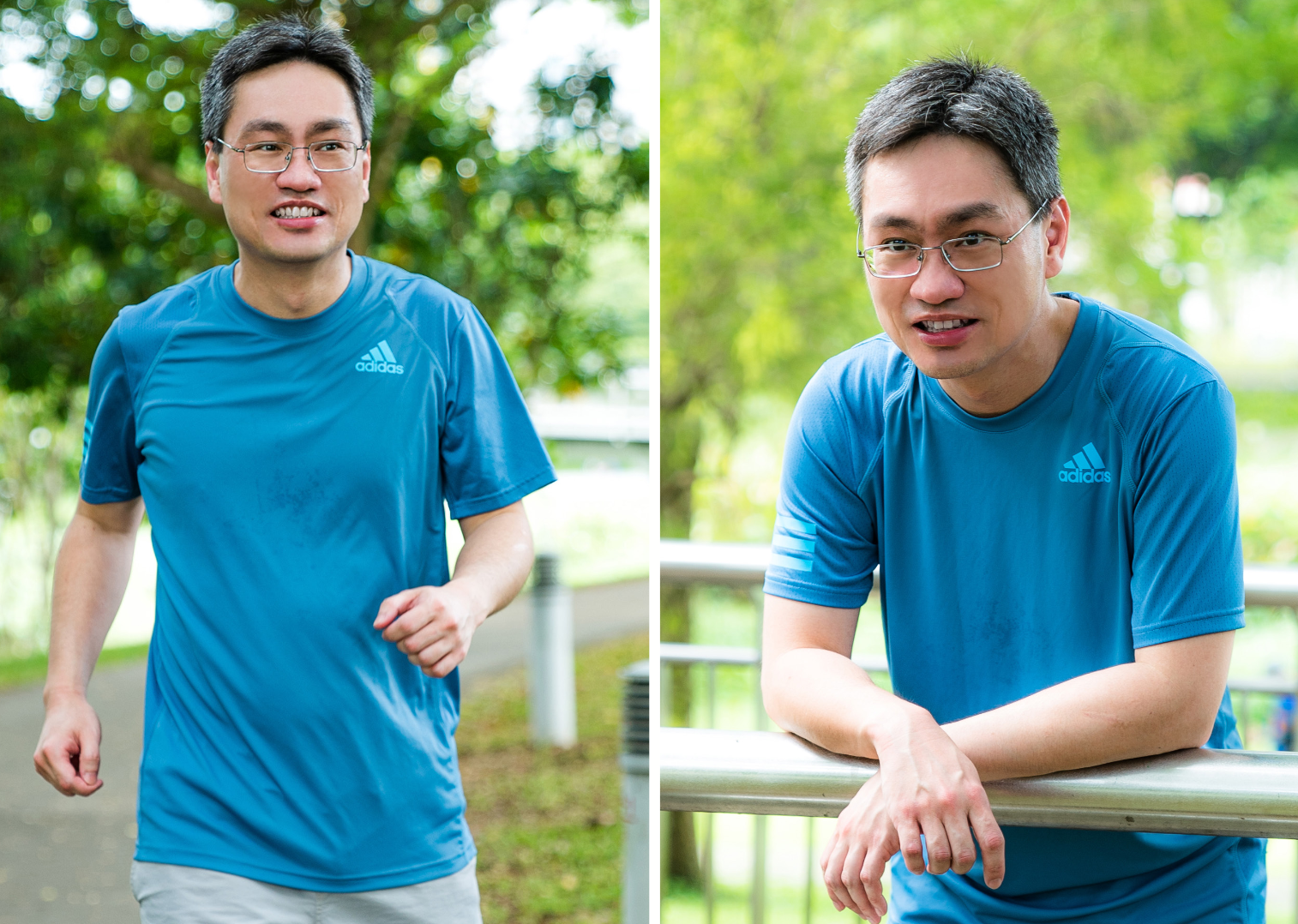
Talking about doing ward rounds, tell us more about your medical profession. Why did you choose urology as your medical specialty?
TL: I get asked about this a lot! To me, urology seems to have the perfect balance in a lot of different aspects. As a surgical discipline, urology is not just about operating on patients. Many urological conditions can be managed with lifestyle modifications and medication. In terms of urological surgeries, they are actually highly varied in terms of approaches. There is often more than one solution for your patient’s medical condition, including open surgeries, endoscopic surgeries, robotic surgeries, etc.
Furthermore, urology – as a discipline – is specialised enough for one to go deeply into the subject and attain mastery, and still be broad enough to sustain the interest of urologists. Urologists are also often innovators and first adopters of medical technologies.
Lastly, urologists are generally very nice and friendly people. Being a small community, we know and work very well with each other.
Your subspecialty is uro-oncology and you focus greatly on robotic urological surgery. What makes robotic urological surgery different from traditional open surgery?
TL: I see the robot as a surgical tool. As surgeons, we choose the most appropriate tools to achieve the best surgical outcomes for our patients. Take radical prostatectomy (removal of the whole prostate gland to treat prostate cancer) as an example. The surgery could be done traditionally via the open or laparoscopic approaches.
Open prostatectomy has the benefit of having the surgeon’s hands in the patient’s body, offering excellent manual dexterity in instrument and tissue handling; but this comes at the expense of a large surgical incision and limited vision, as the prostate is a deep pelvic organ.
On the other hand, laparoscopic prostatectomy is a minimally invasive approach which allows the surgery to be completed via keyhole-sized incisions. The main limitations of this approach are the limited dexterity offered by the surgical instrument and the 2D vision, which makes certain aspects of the surgery – such as suturing tissues together – very difficult.
The robotic approach can be thought of as a combination of the best of both worlds. It allows for magnified 3D visualisation of the operative field and dexterity in instrument handling (similar to having the surgeon’s hands in the body) in a surgery that can be performed via keyhole-sized incisions. Indeed, many studies have confirmed the superior surgical and functional outcomes of robotic prostatectomy as compared to other surgical approaches.
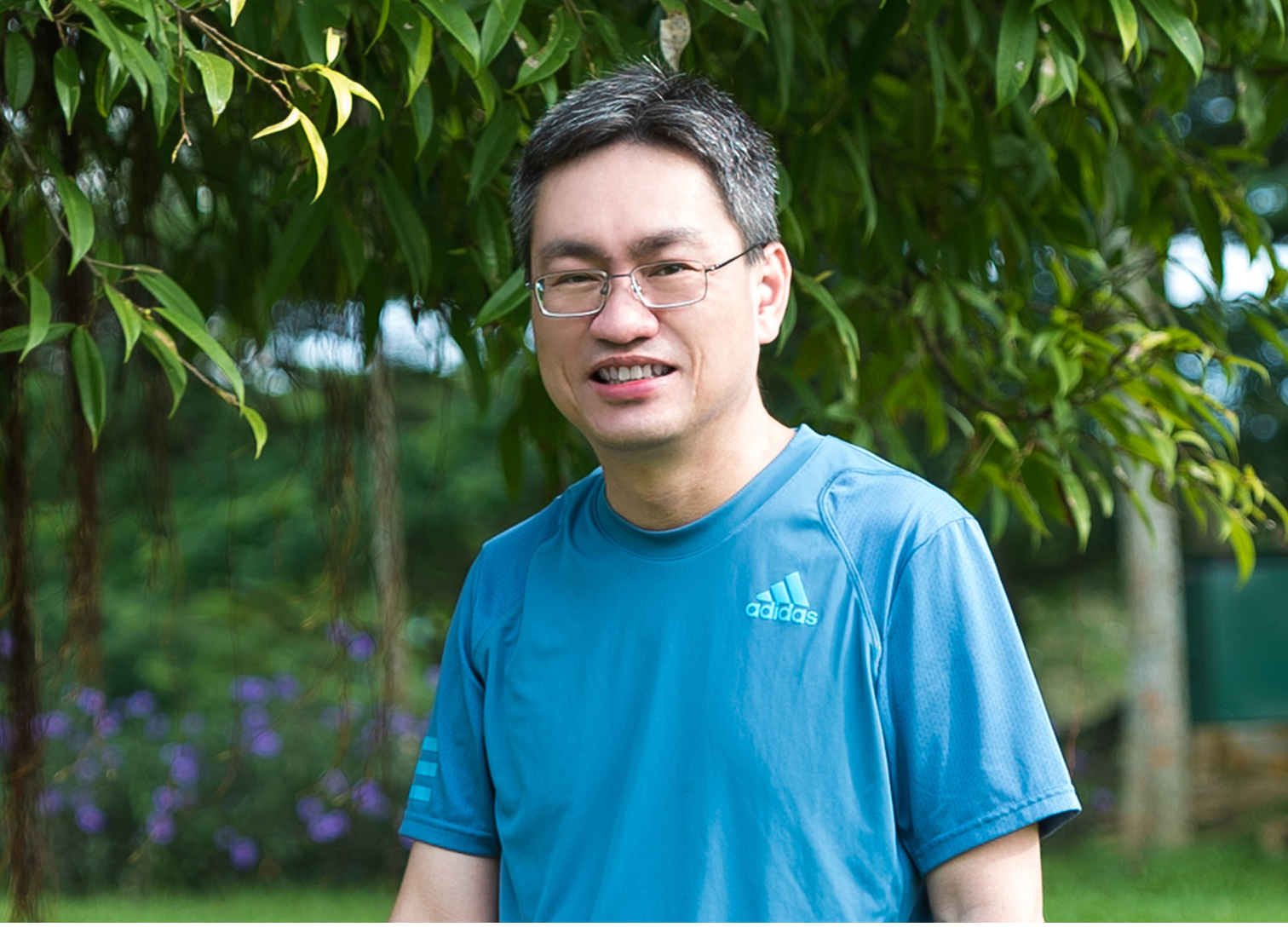
That is an interesting insight into the world of robot-assisted surgery. Let us change pace for a minute: what do you enjoy doing in your free time?
TL: I am quite a foodie, and so is my family! We enjoy trying out new food and restaurants during the weekends. I also enjoy playing computer and video games when I am free.
Being a foodie, do you pay much attention to what you eat?
TL: I must admit that I do not pay much attention to what I eat. I am a foodie and I enjoy great-tasting food, even if it is unhealthy! Luckily, my wife cooks healthy food for me.
What are your thoughts on diets and supplements?
TL: Personally, I have never gone on a diet intentionally all my life. I do skip lunch frequently, often due to work commitments, rather than for the purpose of losing weight. Then again, luckily for me, there is evidence that intermittent fasting has health benefits.
I do not take any supplements. I believe in getting all our required nutrition from the food we eat. A balanced diet is more important.
Playing video and computer games: has this hobby helped or influenced your life (professional or personal) in any way?
TL: I personally find that playing video and computer games is helpful for my practice. I think the many hours I spent on video games when I was young have helped me to train my hand-eye coordination, spatial orientation and visualisation of three-dimensional forms.
In fact, I would say that robotic surgeries are a lot like playing video games. You move your hands and fingers to control the robot, and make split-second decisions based solely on what you see. You have to reconstruct a 3D mental image of the target organ from 2D CT or MRI imaging, and match that mental image to what you see in the operative field to facilitate a successful surgery.
Maybe this is why I find doing robotic surgeries second nature and comfortable. Being a surgeon is highly stressful. You cannot make mistakes during surgeries as mistakes can often be fatal to the patients.
I have to add that as I grow older, I have found playing slower-paced strategy games to be stress relieving. There are not many things or times in life (certainly not during surgery!) where you are allowed to take your time to think and make mistakes without suffering real-life consequences. When I play computer games, there is always the option of reloading a previously saved game or restarting all over again if things go awry. There is no such option in real life. You need to stay focused and meticulous all the time. There is no restart button for real-life situations.
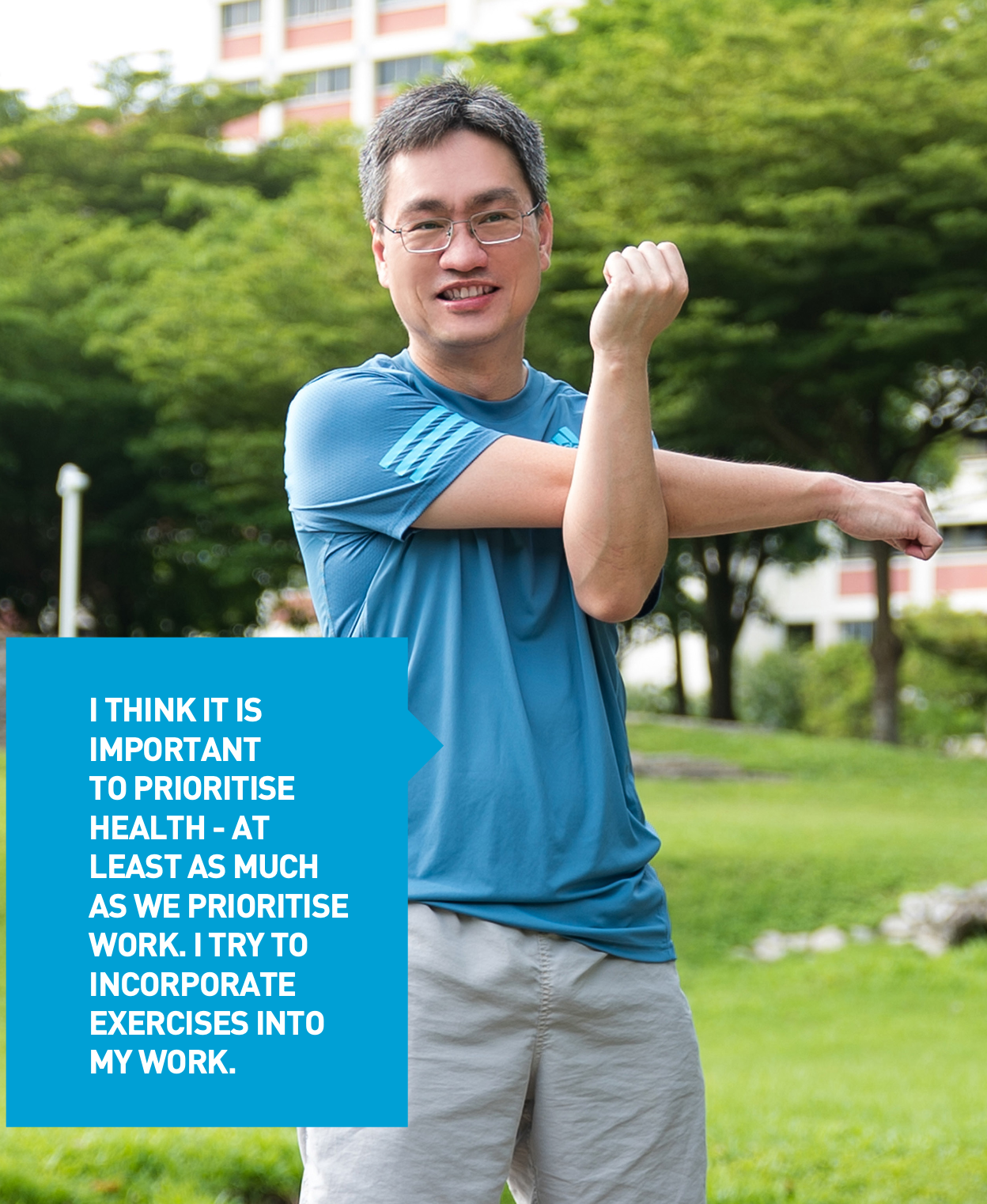
Now that we are in a park taking in some exercise, let us talk about physical activities. Tell us how do you normally keep fit?
TL: I try to jog about three times a week. I only took up jogging in the last 3-4 years. Although I do not always enjoy it, I choose to do so because it is good for cardiovascular health. It is also a form of discipline training for me. Anyone can do the things they enjoy, but doing the things you dislike trains your discipline and mental strength.
Do you normally jog alone or with company?
TL: I jog alone. My wife is an avid jogger and she jogs about 15km daily at 4am. Although she has often asked me to join her, I am unable to keep up with her. In truth, I am probably unable to wake up that early to jog with her anyway. However, we do plan to start cycling together one day.
Exercise and rest. They come hand-in-hand. How many hours of sleep do you get daily?
TL: I generally sleep about 5-6 hours a day on weekdays, and about 6-7 hours during weekends. As doctors, we are used to performing without adequate rest. It is almost like part of our training.
How do you cope with daily stresses?
TL: Operating on a complex major surgical case is highly stressful. There is always the possibility of catastrophic complications during surgery, even in the hands of the most experienced and competent surgeon. I think a major aspect of surgical training is coping with anxieties and uncertainties, and remaining composed during times of stress. I am actually not aware of how I cope with situational stresses during surgeries; I just cope. It is second nature to me. Away from work, playing computer games certainly helps me to relieve stress.
We are in the final part of our interview where we gather some thoughts from you. From your experience, what are the things we can learn from other countries in terms of the way health and wellness is viewed and approached?
TL: Being an Asian society, Singapore shares many similarities with other Asian countries. We work very hard, eat unhealthily, and are constantly stressed and engaged in the rat race. We do not know when to stop working.
And yet…we are actually better than a number of other fellow Asian countries! I spent a year in South Korea during my training about 10 years ago. South Koreans also tend to eat unhealthily, and work extremely long hours; but some would also smoke and drink excessively.
Contrast this with Western countries like Australia and the Scandinavian states. They have a totally different approach on work-life balance. Six-hour work days are common in these places. Denmark and Australia are even piloting a four-day work week! It would be good for us to take a look at their practices and start taking work-life balance more seriously.
What do you think are some of the challenges that modern life poses to health?
TL: One of the major health challenges that modern living poses is digital connectivity. Instant messaging platforms like WhatsApp, Discord and Telegram, as well as social media platforms like Facebook and Instagram have enabled people from all over the world to connect with each other in ways we had never seen before. This has led to the emergence of the “constant checker” – a person who is constantly and obsessively checking his/her emails, texts and social media accounts.
Indeed, studies have shown that the number of “constant checkers” have increased exponentially in recent years. The line between being at work and off work is increasingly blurred, and rest time is definitely compromised.
Social media has also led to unhealthy comparisons between people and this is undoubtedly detrimental to mental health. In fact, many studies have observed that more time spent on social media is associated with an increased risk of loneliness and depression.
In your line of work, what aspects of health do you often see people neglecting?
TL: As a urologist, I often see patients with urinary issues. Although most urinary symptoms are due to benign causes, they may also herald certain underlying medical conditions like cancers or heart diseases. Hence, it is vital to get such symptoms evaluated, even though most of these symptoms can be easily and are often ignored/neglected.
Finally, what parting health advice do you have for Prime readers?
TL: Eat healthily, engage in physical exercise and take care of your mental health. I am a firm believer in health screenings. Many diseases are asymptomatic during their early stages, and these diseases can often only be picked up by health screenings. Hence, I always tell my patients that just because they do not know they have a condition does not mean the condition is not there. When picked up early, almost all diseases can be treated with excellent outcomes.
DR LIM SEY KIAT TERENCE
Senior Consultant Urologist | Assure Urology & Robotic Centre
3 Mount Elizabeth, #17-16 Medical Centre, Singapore 228510
Email: info@assureurology.sg
Website: www.assureurology.sg
PRIME
Watch Dr Lim Sey Kiat Terence Video here..


